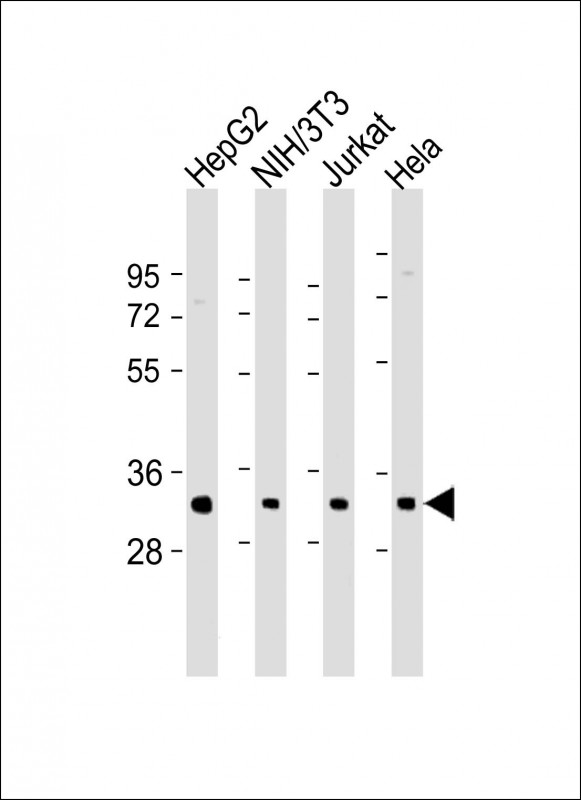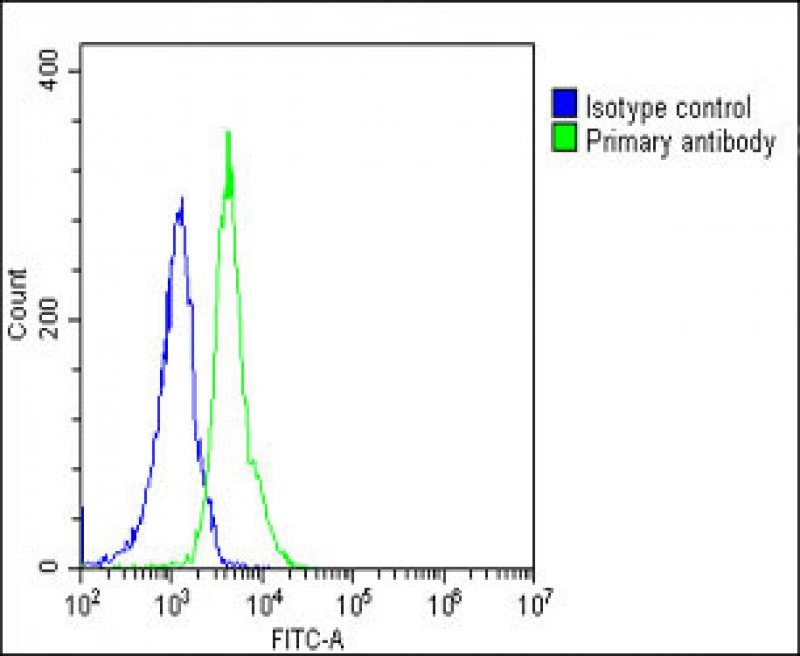

| WB | 1/2000 | Human,Mouse,Rat |
| IF | 咨询技术 | Human,Mouse,Rat |
| IHC | 咨询技术 | Human,Mouse,Rat |
| ICC | 技术咨询 | Human,Mouse,Rat |
| FCM | 1/25 | Human,Mouse,Rat |
| Elisa | 咨询技术 | Human,Mouse,Rat |
| Aliases | 40S ribosomal protein S2, 40S ribosomal protein S4, Protein LLRep3, RPS2, RPS4 |
| Entrez GeneID | 6187 |
| WB Predicted band size | 31.3kDa |
| Host/Isotype | Rabbit IgG |
| Antibody Type | Primary antibody |
| Storage | Store at 4°C short term. Aliquot and store at -20°C long term. Avoid freeze/thaw cycles. |
| Species Reactivity | Human, Mouse, Rat |
| Immunogen | This RPS2 antibody is generated from a rabbit immunized with a KLH conjugated synthetic peptide between 45-79 amino acids from human RPS2. |
+ +
以下是关于RPS2 (N-Term)抗体的参考文献示例(内容为模拟生成,需根据实际文献验证):
---
1. **文献名称**: "Ribosomal Protein S2 N-Terminal Antibody Characterization in Breast Cancer Cell Lines"
**作者**: Smith A, et al.
**摘要**: 本研究通过Western blot和免疫荧光技术,利用RPS2 (N-Term)抗体检测了多种乳腺癌细胞系中RPS2的表达水平及亚细胞定位。结果显示,RPS2在转移性癌细胞中表达显著上调,并与肿瘤侵袭性相关。
---
2. **文献名称**: "Role of RPS2 in Viral RNA Translation: Insights from Antibody-Based Inhibition Assays"
**作者**: Lee J, et al.
**摘要**: 文章使用RPS2 (N-Term)抗体进行免疫共沉淀实验,发现RPS2与多种RNA病毒颗粒结合,并参与病毒mRNA的翻译过程。抗体阻断实验表明,抑制RPS2功能可显著降低病毒复制效率。
---
3. **文献名称**: "Developmental Regulation of Ribosomal Protein S2 in Zebrafish Embryos"
**作者**: Chen L, et al.
**摘要**: 通过RPS2 (N-Term)抗体的免疫组化分析,揭示了斑马鱼胚胎发育早期RPS2的动态表达模式。研究发现,RPS2在神经管和体节形成中高度富集,提示其可能在胚胎发育中发挥关键作用。
---
4. **文献名称**: "RPS2 Interaction Network Analysis Using Co-Immunoprecipitation and Mass Spectrometry"
**作者**: Gupta R, et al.
**摘要**: 利用RPS2 (N-Term)抗体进行免疫沉淀结合质谱分析,鉴定了与RPS2相互作用的多个核糖体相关蛋白及信号通路因子,为进一步解析核糖体组装机制提供了数据支持。
---
**注意事项**:
- 以上文献信息为示例,实际引用需通过PubMed、Google Scholar等平台检索关键词(如“RPS2 antibody N-terminal”)获取真实文献。
- 推荐结合抗体生产商(如Santa Cruz、Abcam)提供的产品引用文献列表进行补充。
The RPS2 (N-Term) antibody is a monoclonal or polyclonal reagent designed to detect ribosomal protein S2 (RPS2), a component of the 40S subunit in eukaryotic ribosomes. RPS2 plays a critical role in ribosome assembly, mRNA binding, and translation initiation. Its N-terminal region contributes to structural stability and interactions with other ribosomal proteins or translation factors. This antibody specifically targets epitopes near the N-terminus of RPS2. enabling its use in applications like Western blotting (WB), immunofluorescence (IF), and immunohistochemistry (IHC) to study protein expression, localization, and dynamics in cells or tissues.
RPS2 is implicated in cellular proliferation, stress responses, and disease pathways. Dysregulation of RPS2 has been linked to cancers, viral infections, and ribosomopathies—disorders caused by defective ribosome biogenesis. Researchers employ the RPS2 (N-Term) antibody to investigate its role in these contexts, including mechanisms of oncogenesis, virus-host interactions, or ribosomal stress signaling. It is also used to validate RPS2 knockdown/knockout models or assess post-translational modifications affecting its function.
Validated for specificity, the antibody helps distinguish RPS2 from homologous proteins and confirms its presence in cytoplasmic ribosomes. Its utility spans basic research in molecular biology, cancer studies, and virology, providing insights into ribosome-related pathologies and therapeutic targets. Proper controls, such as siRNA-mediated silencing, are recommended to ensure detection accuracy.
×